人教新目标英语八年级下册讲义—Unit 9 Have you ever been to a ……
初中英语人教新目标版(2012)八年级下册Unit 9 Have you ever been to
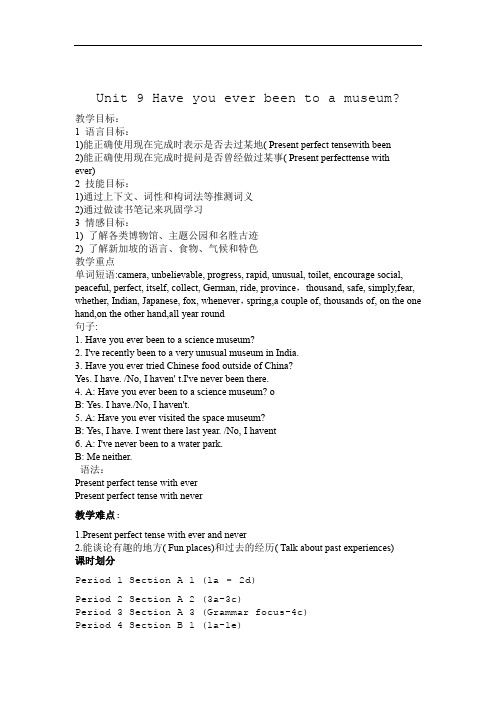
Unit 9 Have you ever been to a museum?教学目标:1 语言目标:1)能正确使用现在完成时表示是否去过某地( Present perfect tensewith been2)能正确使用现在完成时提问是否曾经做过某事( Present perfecttense with ever)2 技能目标:1)通过上下文、词性和构词法等推测词义2)通过做读书笔记来巩固学习3 情感目标:1)了解各类博物馆、主题公园和名胜古迹2)了解新加坡的语言、食物、气候和特色教学重点单词短语:camera, unbelievable, progress, rapid, unusual, toilet, encourage social, peaceful, perfect, itself, collect, German, ride, province,thousand, safe, simply,fear, whether, Indian, Japanese, fox, whenever,spring,a couple of, thousands of, on the one hand,on the other hand,all year round句子:1.Have you ever been to a science museum?2.I've recently been to a very unusual museum in India.3.Have you ever tried Chinese food outside of China?Yes. I have. /No, I haven' t.I've never been there.4.A: Have you ever been to a science museum? oB: Yes. I have./No, I haven't.5.A: Have you ever visited the space museum?B: Yes, I have. I went there last year. /No, I havent6.A: I've never been to a water park.B: Me neither.语法:Present perfect tense with everPresent perfect tense with never教学难点:1.Present perfect tense with ever and never2.能谈论有趣的地方( Fun places)和过去的经历( Talk about past experiences)课时划分Period 1 Section A 1 (1a – 2d)Period 2 Section A 2 (3a-3c)Period 3 Section A 3 (Grammar focus-4c)Period 4 Section B 1 (1a-1e)Period 5 Section B 2 (2a-2e)Period 6 Section B 3 (3a-Self check)Period 1 Section A 1 (1a-2d)教学目标1. Knowledge and Ability Objects(1) Key vocabulary: amusement; neither(2) Listening practice.(3) Target language:1.Lets' go somewhere different today.2.Have you ever been to…? Yes, I have./ No, I haven't.3.How about/what about…?4.How are we going to get there?5.We can take the subway/…(4) To train students' listening and speaking skills.2. Method Objects in Teaching(1) Scene teaching method.(2) Listening and speaking methods.(3) Pair work.3. Sensibility and ValueTo be interested in taking part in all kinds of activities in English class.Teaching Key Points1. Key vocabulary in this period.2. Target language in this period.Teaching DifficultyMake conversations freely using the target language.教学过程Teaching Procedures课前三分钟:中国共产党党史党的一大:中国共产党诞生1921年,中国共产党在上海召开第一次全国代表大会,宣告了中国共产党的成立。
人教版新目标英语八年级下册:Unit 9《Have you ever been to museum》 讲解+练习题目+答案
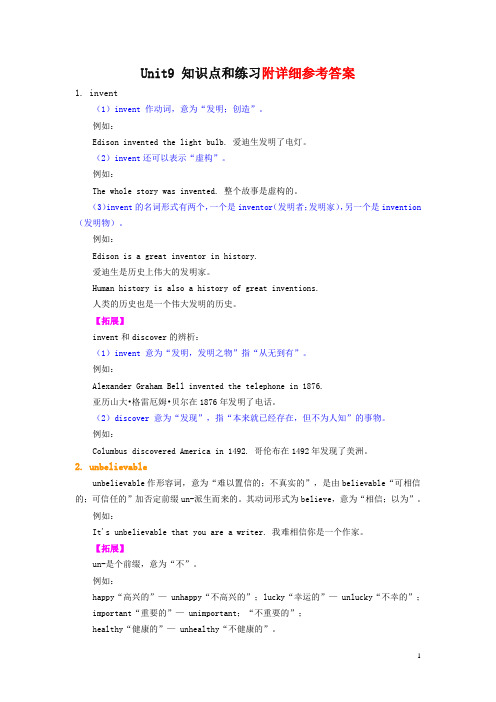
Unit9 知识点和练习附详细参考答案1. invent(1)invent 作动词,意为“发明;创造”。
例如:Edison invented the light bulb. 爱迪生发明了电灯。
(2)invent还可以表示“虚构”。
例如:The whole story was invented. 整个故事是虚构的。
(3)invent的名词形式有两个,一个是inventor(发明者;发明家),另一个是invention (发明物)。
例如:Edison is a great inventor in history.爱迪生是历史上伟大的发明家。
Human history is also a history of great inventions.人类的历史也是一个伟大发明的历史。
【拓展】invent和discover的辨析:(1)invent 意为“发明,发明之物”指“从无到有”。
例如:Alexander Graham Bell invented the telephone in 1876.亚历山大•格雷厄姆•贝尔在1876年发明了电话。
(2)discover 意为“发现”,指“本来就已经存在,但不为人知”的事物。
例如:Columbus discovered America in 1492. 哥伦布在1492年发现了美洲。
2. unbelievableunbelievable作形容词,意为“难以置信的;不真实的”,是由believable“可相信的;可信任的”加否定前缀un-派生而来的。
其动词形式为believe,意为“相信;以为”。
例如:It's unbelievable that you are a writer. 我难相信你是一个作家。
【拓展】un-是个前缀,意为“不”。
例如:happy“高兴的”— unhappy“不高兴的”;lucky“幸运的”— unlucky“不幸的”;important“重要的”— unimportant;“不重要的”;healthy“健康的”— unhealthy“不健康的”。
人教版新目标讲义初二下册英语unit9
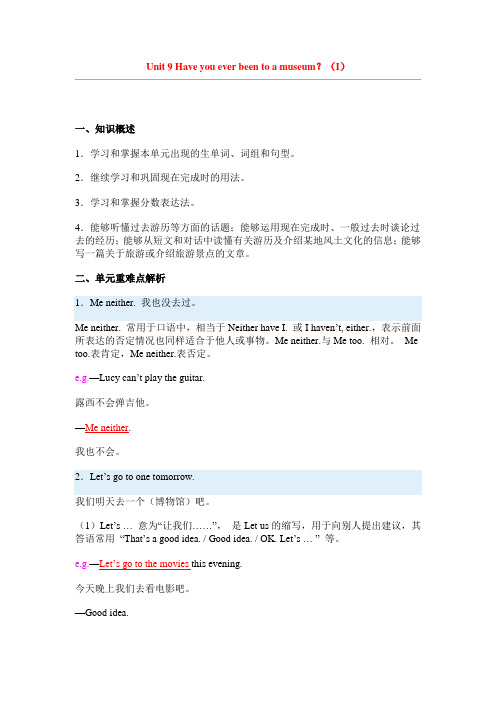
Unit 9 Have you ever been to a museum?(I)一、知识概述1.学习和掌握本单元出现的生单词、词组和句型。
2.继续学习和巩固现在完成时的用法。
3.学习和掌握分数表达法。
4.能够听懂过去游历等方面的话题;能够运用现在完成时、一般过去时谈论过去的经历;能够从短文和对话中读懂有关游历及介绍某地风土文化的信息;能够写一篇关于旅游或介绍旅游景点的文章。
二、单元重难点解析1.Me neither. 我也没去过。
Me neither. 常用于口语中,相当于Neither have I. 或I haven’t, either.,表示前面所表达的否定情况也同样适合于他人或事物。
Me neither.与Me too. 相对。
Me too.表肯定,Me neither.表否定。
e.g.—Lucy can’t play the guitar.露西不会弹吉他。
—Me neither.我也不会。
2.Let’s go to one tomorrow.我们明天去一个(博物馆)吧。
(1)Let’s …意为“让我们……”,是Let us的缩写,用于向别人提出建议,其答语常用“That’s a good idea. / Good idea. / OK. Let’s …”等。
e.g.—Let’s go to the movies this evening.今天晚上我们去看电影吧。
—Good idea.注意:let’s和let us后面接动词原形,即let’s do sth.。
let sb. do sth. 意为“让某人做某事”。
e.g.Let Jim go home alone.让吉姆独自回家吧。
拓展:虽然let us 可以缩写为let’s,但let’s和let us所构成的祈使句并不完全相同。
① let’s …“让我们……”,表示向对方提出建议,包括说话和对方在内,其反义疑问句句式是shall we.e.g.Let’s go fishing, shall we?咱们去钓鱼,好吗?(包含说话者对方在内)② let us …“让我们……”,不包括对方在内的,具有请求允许的意味,其反义疑问句形式是will you。
新课标人教版八年级英语下册Unit 9 Have you ever been to an amuse

—So did Tina.
中国地图
蒂娜也去了。
—He has been a soldier for two years.
要点点拨
他已经当了两年兵了。
go inline skating 滑旱冰
—So have I.
我也是。
全析提示
3.Look at the map of the town.Listen and circle the places 助动词 have 和 has 可以与前面的
you hear.
主语缩略’ve 和’s。
看城镇的地图。听录音并圈出你听到的地方。
如:we’ve,they’ve,he’s,
water world 水上世界
it’s 等。
city library 城市图书馆
have not 常缩略为 haven’t,has
fun times amusement park
如果说“欢迎回家”该怎么说呢?
把 1a 中你的回答和你搭档的回答对照一下。
Wele back home!
4.For me,“I have to!” is number two.
对我来说“I have to!”是第二位的。
要点点拨
5.Listen to a teacher interview a student.Circle the newsletter 业务通讯;新闻信札
route“路线、小路、小巷”,使
The main attraction was a Charlie Chaplin film.
用 X 围也较小。course 表示船的
吸引人的主要是查理·卓别林的电影。
“航道”或飞机的“航线”。
The idea of being a teacher has little attraction to young
新课标人教版八年级英语下册Unit 9 Have You Ever Been to an Amuse

Unit 9 Have You Ever Been to an Amusement Park?一、学习目标:1.掌握现在完成时的用法;2.了解一般过去时、现在完成时和现在完成进行时的意义的区别;3.能够准确使用多种时态谈论自己的经历。
二、学习重点难点:1. 现在完成时由主语+have/has+过去分词构成。
其主要用法如下:I.在未指明具体时间的情况下,现在完成时动词通常可以表示在说话之前已经完成,而后果或影响至今仍存在的动作。
例如:The concert has started. 音乐会已经开始。
I have had breakfast. 我已吃过早饭。
注意:have gone to 和have been to 在意义上有区别。
例如:He has gone to Hong Kong. 他到某某去了。
(他已前往某某,或在途中,或已到达。
说话人暗示他现在不在现场。
)He has been to Hong Kong. 他曾到过某某。
(说话人认为他过去到过某某,现在已不在该地。
言外之意他对某某有所了解。
)II. 现在完成时动词可以表示开始于过去持续到现在(也许还会继续进行下去)的动作或状态。
例如:1) I have studied English since last year. 我从去年开始学习英语。
2) She has lived in Beijing for five years. 她住在已经五年了。
注意:e, go , leave, arrive, buy, lose, receive, join, die, bury 和marry 等动词所表示的动作是一时的,不能延续的,故不能与for …,since …等开头的表示一段时间的状语连用。
不过,这些词用于否定句则可以与表示持续的时间状语连用,即动作的不发生是可以持续的。
例如:不能说:*He has e to Beijing for two years.*He has bought that book for three weeks.*He has joined the Army for one and a half years.*His grandma has died for nine months.* I have received his letter for a month.可以说:He has been in Beijing for two years.He has had that book for three weeks.He has been in the army for one and a half years.His grandma has been dead for nine months.I haven't received his letter for almost a month.或者:It is two years since he came to Beijing.It is three weeks since he bought that book.It is one and a half years since he joined the Army.It is nine months since his grandma died.2. 现在完成时把过去的动作和现在的结果联系起来,一般过去时只限于表示过去的动作本身,与现在的结果无关。
新目标英语八年级下册Unit 9 Have you ever been to an amusement park讲解与练习

第 1 页 (共4 页) 第 2 页 (共4 页)学校 姓名 班级 考场 考号---------------------------------○密------------------ -------------------○封----------------------------- -- --○线----------------------------※※※※※※※※※※※※※※※答※※※※※※※※※※※※※※※※※※题※※※※※※※※※※※※※※※※线※※※※※※※※※※※※※新目标英语八年级下册Unit 9 Have you ever been to an amusement park?讲解与练习重要短语1. have been to 到过某处2. an amusement park 游乐园3. a water park 水上公园4. a roller coaster 过山车5. see sb. doing sth. 看见某人正在做某事 see sb. do sth. 看见某人做了某事6. walk around 四处走动7. take a ride 兜风 8. on board 在船上 9. take different routes 走不同的路线 10. end up 结束 11. argue with sb. 与某人争吵 12. an English-speaking country 说英语的国家 13. an exchange student 交换生 14. a flight attendant 一名机组乘务员 15. a tour guide 导游 16. such as 例如 17. listening skills 听力技能 18. in Southeast Asia 在东南亚 19. take a holiday 度假 20. three quarters 四分之三 21. have problems (in) doing sth. 做某事很费劲 22. during the daytime = in the day 在白天 23. all year round 全年,一年到头 24. wake up 醒来,唤醒,叫醒 句子讲解1.Have you ever been to an amusement park?你曾到过游乐场吗?(1)amusement park 游乐场,游乐园 (2)本句用现在完成时表示过去发生的事情对现在造成的影响或结果。
人教新目标版初中英语八年级下册Unit9Haveyoueverbeentoamuseum要点讲解
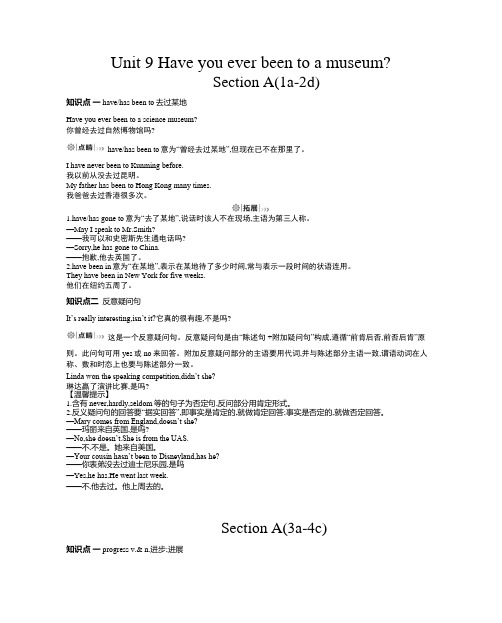
Unit 9 Have you ever been to a museum?Section A(1a-2d)知识点一have/has been to去过某地Have you ever been to a science museum?你曾经去过自然博物馆吗?have/has been to意为“曾经去过某地”,但现在已不在那里了。
I have never been to Kunming before.我以前从没去过昆明。
My father has been to Hong Kong many times.我爸爸去过香港很多次。
1.have/has gone to意为“去了某地”,说话时该人不在现场,主语为第三人称。
—May I speak to Mr.Smith?——我可以和史密斯先生通电话吗?—Sorry,he has gone to China.——抱歉,他去英国了。
2.have been in意为“在某地”,表示在某地待了多少时间,常与表示一段时间的状语连用。
They have been in New York for five weeks.他们在纽约五周了。
知识点二反意疑问句It’s really interesting,isn’t it?它真的很有趣,不是吗?这是一个反意疑问句。
反意疑问句是由“陈述句 +附加疑问句”构成,遵循“前肯后否,前否后肯”原则。
此问句可用yes或no来回答。
附加反意疑问部分的主语要用代词,并与陈述部分主语一致,谓语动词在人称、数和时态上也要与陈述部分一致。
Linda won the speaking competition,didn’t she?琳达赢了演讲比赛,是吗?【温馨提示】1.含有never,hardly,seldom等的句子为否定句,反问部分用肯定形式。
2.反义疑问句的回答要“据实回答”,即事实是肯定的,就做肯定回答;事实是否定的,就做否定回答。
—Mary comes from England,doesn’t she?——玛丽来自英国,是吗?—No,she doesn’t.She is from the UAS.——不,不是。
八年级英语下册Unit9Haveyoueverbeentoanamusementpark词汇详细用法人教新目标版

Unit 9 Have you ever been to an amusement park ?68页1.amusement [ u ] 娱乐、消遣an amusement park 游乐场Have you ever been to an amusement park? 你曾经去过一个游乐场吗?Fun Times Amusement Park 欢乐时光游乐场。
复习have been to 去过,回来了have gone to 去了,现在不在这里have been in 去了,还在那里2. neither① adj. pron 二者都不Neither answer is correctNeither of the answers is / are correct.Which do you like? Neither I think they’re both ugly.② adv. 也不I don’t know. Me neither. I don’t know, either.70页3. Disneyland 迪斯尼乐园(前无冠词)Have you ever been to Disneyland?In fact, there are now several different Disneyland amusement parks around the world. 事实上,现在世界上有好几处不同的迪斯尼游乐场。
around the world = all over the worldacross China = all over China4. Mickey Mouse 米老鼠5. Donald Duck 唐老鸭6. character①性格I know his character very well.②汉字Chinese characters③人物、角色famous characters from Chinese historyDisney characters 迪斯尼人物Mickey Mouse and Donald Duck are famous Disney characters.7. seen see的过去分词。
八下新目标英语Unit_9_Have_you_ever_been_to_a_museum?

【2012贵州贵阳】 “Have you ever been to Tokyo?” “Yes, I ______ there twice. It’s a modern city.”
A. have gone B. have been C. had gone
【答案】B
考查动词时态及动词的用法。问句用的是现 在完成时,答句也应该用现在完成时,前后 时态一致。have gone意为“去过,但还没回 来”;have been意为“去了,回来了”。根 据句意:你去过东京吗?我去过两次,它是 一个现代城市。故选B.
the final.
— I think so. He ________ for it for months.
A. is preparing
B. was preparing
C. had been preparing
D. has been preparing
2. By the time he realizes he _________ into a
D. Did; show
8. — Hi, Tracy, you look pale.
— I am tired. I ______ the living room all day.
A. painted
B. had painted
C. have been painting D. have painted
C. considered D. is going to consider
7. —______ you ______ him around the museum
yet?
—Yes. We had a great time there.
A. Have ; shown
新目标人教版初中英语八年级下册Unit9Haveyoueverbeen
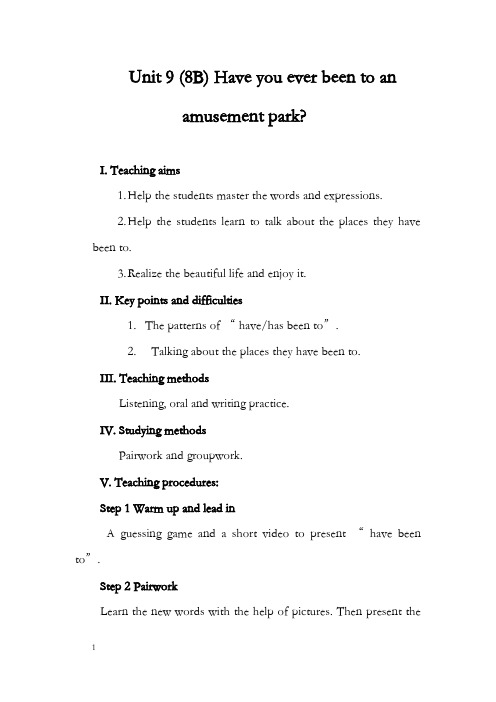
Unit 9 (8B) Have you ever been to anamusement park?I. Teaching aims1.Help the students master the words and expressions.2.Help the students learn to talk about the places they havebeen to.3.Realize the beautiful life and enjoy it.II. Key points and difficulties1.The patterns of “ have/has been to”.2.Talking about the places they have been to.III. Teaching methodsListening, oral and writing practice.IV. Studying methodsPairwork and groupwork.V. Teaching procedures:Step 1 Warm up and lead inA guessing game and a short video to present “have been to”.Step 2 PairworkLearn the new words with the help of pictures. Then present thenew dialogue and have the students practice the dialogue.Step 3 1b listen and find out what places they have been to.Step 4 Game(magic eyes)Show the photos of some places quickly, have the students tell the answers quickyly. It is to practice “He/She has been to…”Step 5 2a Listening. Listen and circle the places they hear.Step 6 2b ListeningStep 7 GroupworkWork in groups of four. Take turns to ask their partners. The others answer the questions as quickly as you can.Step 8 SummaryAsk the students to summarize what we learned. (words and expressions)Step 9 Surveyone of their friends and write the report.their passages in class.Step 10 HomeworkWrite about one of their own trips by using what they have learned.Enjoy traveling!Survey one of your friends and try to write your report.1.Do you like going out on vacation ?Very much A little Not at all2.How often do you go out to have fun?Usually Often Sometimes Never 3.Where have you been?_______________________________4.When did you go to …?_______________________________5.Where are you going next vacation?_______________________________6.How are you going there?Other ways ___________7. (other questions you want to know)…Report: My good friend … likes …. She/He…。
人教版新目标英语八年级下册:Unit 9《Have you ever been to a museum》知识点梳理及单元复习

Unit 9知识点梳理和单元复习附参考答案1. 单元重点短语归纳:2. Have you ever been to a science museum? 你曾经去过科学博物馆吗?【重点】【辨析】have/has been to;have / has gone to ;have/ has been in;(1). have/ has been to 表示“某人曾经去过某地”强调现在已经回来了,不在那里了。
E.g.: We have been to Qingdao. 我们去过青岛。
(现在不在青岛)(2). have gone to表示“某人到某地去了”,强调现在还没有回来,可能在那里或途中。
E.g.: They have gone to Sydney. 他们去悉尼了。
(现在在悉尼或途中)(3). have been in +地点:表示“某人在某地待了很长时间”,常与时间段搭配。
E.g.: I have been in Nanchang for three years. 我在南昌待了3年了。
How long have you been in China? 你在中国待了多长时间?3. 一般过去时与现在完成时的用法比较【重点】&【难点】(1). 一般过去时表示过去某个时间发生的事、存在的状态或经常发生的动作。
说话的侧重点只是陈述一件过去的事情,不强调对现在产生的影响。
E.g.: He visited Guilin in 1998. 在1998年他参观过桂林。
(只说明去桂林的时间)(2). 现在完成时表示动作发生在过去,对现在造成了影响或产生了结果。
不能与确定的过去时间状语连用。
E.g.: Jill has bought a new computer. 吉尔买了一台新电脑。
I have taught here for fifteen years. 我在这儿教学已经15年了。
I have seen the film. 我看过这部电影。
八年级下册Unit 9 Have you ever been to a museum要点讲解
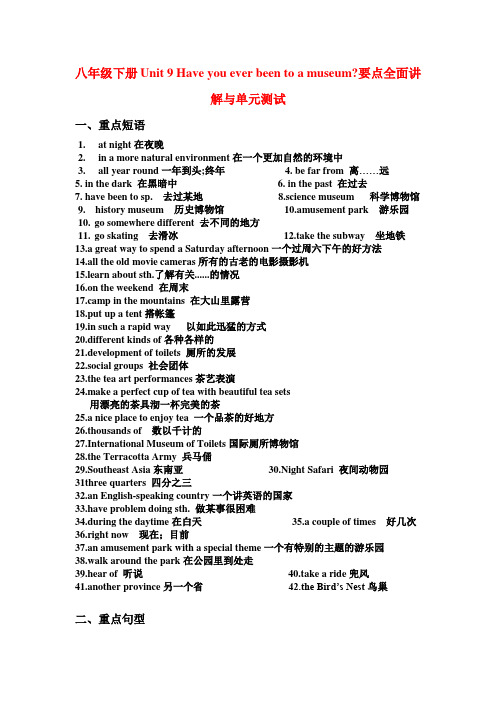
八年级下册Unit 9 Have you ever been to a museum?要点全面讲解与单元测试一、重点短语1.at night在夜晚2.in a more natural environment在一个更加自然的环境中3.all year round一年到头;终年4. be far from 离……远5. in the dark 在黑暗中6. in the past 在过去7. have been to sp. 去过某地8.science museum 科学博物馆9.history museum 历史博物馆10.amusement park 游乐园10.go somewhere different 去不同的地方11.go skating 去滑冰12.take the subway 坐地铁13.a great way to spend a Saturday afternoon一个过周六下午的好方法14.all the old movie cameras所有的古老的电影摄影机15.learn about sth.了解有关......的情况16.on the weekend 在周末17.camp in the mountains 在大山里露营18.put up a tent搭帐篷19.in such a rapid way 以如此迅猛的方式20.different kinds of各种各样的21.development of toilets 厕所的发展22.social groups 社会团体23.the tea art performances茶艺表演24.make a perfect cup of tea with beautiful tea sets用漂亮的茶具沏一杯完美的茶25.a nice place to enjoy tea 一个品茶的好地方26.thousands of 数以千计的27.International Museum of Toilets国际厕所博物馆28.the Terracotta Army 兵马俑29.Southeast Asia东南亚30.Night Safari 夜间动物园31three quarters 四分之三32.an English-speaking country一个讲英语的国家33.have problem doing sth. 做某事很困难34.during the daytime在白天35.a couple of times 好几次36.right now 现在;目前37.an amusement park with a special theme一个有特别的主题的游乐园38.walk around the park在公园里到处走39.hear of 听说40.take a ride兜风41.another province另一个省42.the Bird’s Nest鸟巢二、重点句型1. Have you ever been to... ?Have you ever been to a science museum? 你曾经去过科学博物馆吗?2. Let’s do sth 让我们一起去做某事吧Let’s go somewhere different today.我们今天去个不同的地方吧。
人教新目标八年级英语下册 Unit 9 Have you ever been to a museu
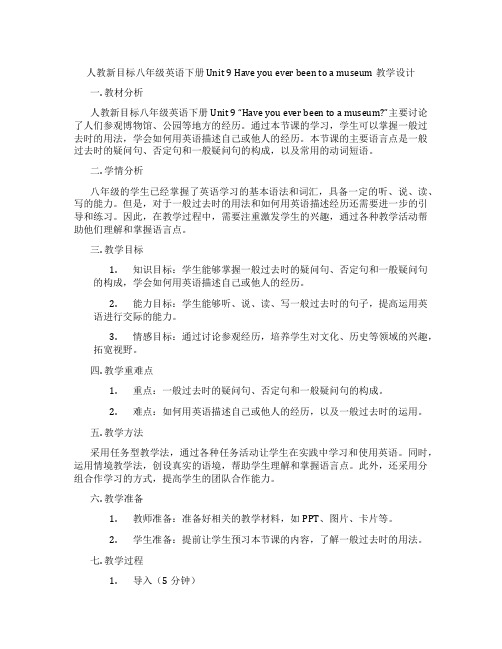
人教新目标八年级英语下册 Unit 9 Have you ever been to a museum教学设计一. 教材分析人教新目标八年级英语下册Unit 9 “Have you ever been to a museum?”主要讨论了人们参观博物馆、公园等地方的经历。
通过本节课的学习,学生可以掌握一般过去时的用法,学会如何用英语描述自己或他人的经历。
本节课的主要语言点是一般过去时的疑问句、否定句和一般疑问句的构成,以及常用的动词短语。
二. 学情分析八年级的学生已经掌握了英语学习的基本语法和词汇,具备一定的听、说、读、写的能力。
但是,对于一般过去时的用法和如何用英语描述经历还需要进一步的引导和练习。
因此,在教学过程中,需要注重激发学生的兴趣,通过各种教学活动帮助他们理解和掌握语言点。
三. 教学目标1.知识目标:学生能够掌握一般过去时的疑问句、否定句和一般疑问句的构成,学会如何用英语描述自己或他人的经历。
2.能力目标:学生能够听、说、读、写一般过去时的句子,提高运用英语进行交际的能力。
3.情感目标:通过讨论参观经历,培养学生对文化、历史等领域的兴趣,拓宽视野。
四. 教学重难点1.重点:一般过去时的疑问句、否定句和一般疑问句的构成。
2.难点:如何用英语描述自己或他人的经历,以及一般过去时的运用。
五. 教学方法采用任务型教学法,通过各种任务活动让学生在实践中学习和使用英语。
同时,运用情境教学法,创设真实的语境,帮助学生理解和掌握语言点。
此外,还采用分组合作学习的方式,提高学生的团队合作能力。
六. 教学准备1.教师准备:准备好相关的教学材料,如PPT、图片、卡片等。
2.学生准备:提前让学生预习本节课的内容,了解一般过去时的用法。
七. 教学过程1.导入(5分钟)通过展示一些博物馆、公园等地方的图片,引导学生谈论自己参观的经历,激发学生的兴趣。
2.呈现(10分钟)教师通过PPT展示一般过去时的疑问句、否定句和一般疑问句的构成,以及常用的动词短语。
2020年八年级下册英语讲义:Unit 9 Have you ever been to a museum 语法及写作(新人教目标版)
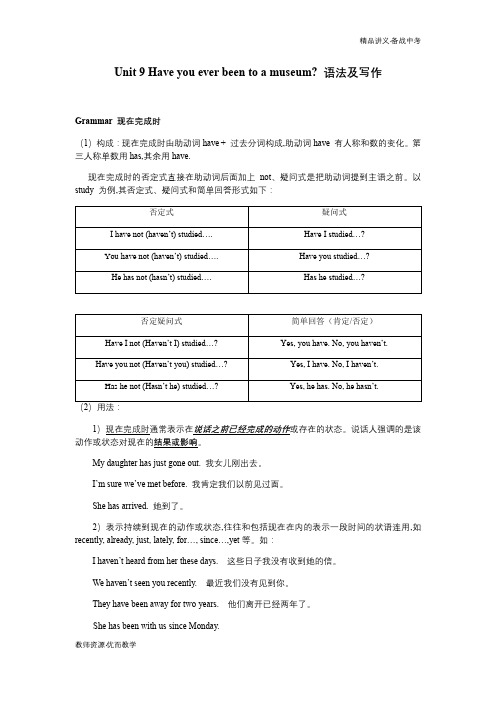
Unit 9 Have you ever been to a museum? 语法及写作Grammar 现在完成时(1)构成:现在完成时由助动词have + 过去分词构成,助动词have 有人称和数的变化。
第三人称单数用has,其余用have.现在完成时的否定式直接在助动词后面加上not、疑问式是把助动词提到主语之前。
以study 为例,其否定式、疑问式和简单回答形式如下:1)现在完成时通常表示在说话之前已经完成的动作或存在的状态。
说话人强调的是该动作或状态对现在的结果或影响。
My daughter has just gone out. 我女儿刚出去。
I’m sure we’ve met before. 我肯定我们以前见过面。
She has arrived. 她到了。
2)表示持续到现在的动作或状态,往往和包括现在在内的表示一段时间的状语连用,如recently, already, just, lately, for…, since…,yet等。
如:I haven’t heard from her these days. 这些日子我没有收到她的信。
We haven’t seen you recently. 最近我们没有见到你。
They have been away for two years. 他们离开已经两年了。
She has been with us since Monday.Exercise:1. I____ already ____ (see) the film. I ________ (see) it last week.2. _____ he ____ (finish) his work today? Not yet.3. My father ____ just ____ (come) back from work. He is tired now.4. Where’s Li Ming ? He __________ (go) to the teacher’s office.5. I __________ (work) here since I ______ (move) here in 1999.6. So far I _______________(make) quite a few friends here.7. How long ________ the Wangs ______________(stay) here ? For two weeks.8. I ________ just ___________ (finish) my homework.9. He ________ (go) to school on foot every day.10.____ you ______ (find) your science book yet?11. If it ____ (be) fine tomorrow, I'll go with you.12. The students ____________ (read) English when the teacher came in.13. Look! The monkey __________ (climb) the tree.14. My mother __________ (come) to see me next Sunday.15. I've lost my pen. _________ you ________ (see) it anywhere?1. have, seen, saw2. Has, finished3. has, come4. has gone5. have worked, moved6. have made7. have, stayed8. have, finished9. goes 10. have, found 11. is 12. were reading 13. is climbing 14. is coming 15. Have, seenAsk the questions1) I have been there for two days.__________ _________ __________ you __________ __________?2) My father has lived here since 2000._________ _________ __________ your father _________ __________?3) He left here yesterday._________ ________ he _________ __________?4) They bought a book two hours ago.__________ ___________ they __________ a book?Keys: 1. How long have, been there 2. How long has, lived here 3. When did, leave here 4. When did, buyUse “never, ever, already, just, yet, for, since” to fill in the blanks.1. I have _______ seen him before, so I have no idea about him.2. Jack has _________ finished his homework.3. Mr. Wang has taught in this school ________ ten years.4. “Have you ________ seen the film?” “No, I have ________ seen it.”5. “Has the bus left _______?” “Yes, it has _________ left.”Keys: 1. never 2. just , already 3. for 4. ever, never 5. yet , just / already作文专题本单元围绕话题“曾经去过的地方”展开,使用现在完成时表达已经做过的事情。
人教新目标版英语八下Unit 9《Have you ever been to a museum》教学
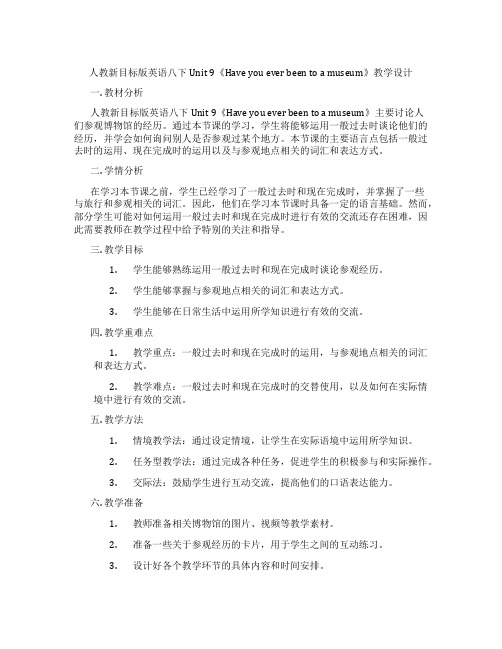
人教新目标版英语八下Unit 9《Have you ever been to a museum》教学设计一. 教材分析人教新目标版英语八下Unit 9《Have you ever been to a museum》主要讨论人们参观博物馆的经历。
通过本节课的学习,学生将能够运用一般过去时谈论他们的经历,并学会如何询问别人是否参观过某个地方。
本节课的主要语言点包括一般过去时的运用、现在完成时的运用以及与参观地点相关的词汇和表达方式。
二. 学情分析在学习本节课之前,学生已经学习了一般过去时和现在完成时,并掌握了一些与旅行和参观相关的词汇。
因此,他们在学习本节课时具备一定的语言基础。
然而,部分学生可能对如何运用一般过去时和现在完成时进行有效的交流还存在困难,因此需要教师在教学过程中给予特别的关注和指导。
三. 教学目标1.学生能够熟练运用一般过去时和现在完成时谈论参观经历。
2.学生能够掌握与参观地点相关的词汇和表达方式。
3.学生能够在日常生活中运用所学知识进行有效的交流。
四. 教学重难点1.教学重点:一般过去时和现在完成时的运用,与参观地点相关的词汇和表达方式。
2.教学难点:一般过去时和现在完成时的交替使用,以及如何在实际情境中进行有效的交流。
五. 教学方法1.情境教学法:通过设定情境,让学生在实际语境中运用所学知识。
2.任务型教学法:通过完成各种任务,促进学生的积极参与和实际操作。
3.交际法:鼓励学生进行互动交流,提高他们的口语表达能力。
六. 教学准备1.教师准备相关博物馆的图片、视频等教学素材。
2.准备一些关于参观经历的卡片,用于学生之间的互动练习。
3.设计好各个教学环节的具体内容和时间安排。
七. 教学过程1.导入(5分钟)教师通过展示一些博物馆的图片和视频,引导学生谈论他们所了解的博物馆。
然后,教师提问:“Have you ever been to a museum?”, 让学生用一般过去时回答。
2.呈现(10分钟)教师呈现本节课的主要内容,包括一般过去时的运用、现在完成时的运用以及与参观地点相关的词汇和表达方式。
- 1、下载文档前请自行甄别文档内容的完整性,平台不提供额外的编辑、内容补充、找答案等附加服务。
- 2、"仅部分预览"的文档,不可在线预览部分如存在完整性等问题,可反馈申请退款(可完整预览的文档不适用该条件!)。
- 3、如文档侵犯您的权益,请联系客服反馈,我们会尽快为您处理(人工客服工作时间:9:00-18:30)。
新目标八年级下册Unit 9 Have you ever been to a museum ?讲义一、重点单词1. amusement n. 娱乐; 游戏2. somewhere adv. 在某处; 到某处3. camera n. 照相机; 摄影机; 摄像机4. invention n. 发明物5. invent v. 发明; 创造1. unbelievable adj. 难以置信的; 不真实的2. progress n. 进步; 进展3. rapid adj. 迅速的; 快速的4. unusual adj. 特别的; 不寻常的5. toilet n. 坐便器; 厕所6. encourage v. 鼓励7. social adj. 社会的8. peaceful adj. 和平的; 安宁的9. performance n. 表演; 演出10. perfect adj. 完美的; 完全的11. itself pron.(it的反身代词) 它自己12. collect v. 收集; 采集13. German adj. 德国的; 德语的; 德国人的n. 德语; 德国人14. theme n. 主题15. ride n. 供乘骑的游乐设施; 短途旅程16. province n. 省份17. simply adv. 仅仅; 只; 不过18. fear v. & n. 害怕; 惧怕19. whether conj. 不管......;还是); 或者......(或者); 是否20. Indian adj.印度的 n. 印度人21. Japanese adj.;日本的; 日本人的; 日语的n. 日本人; 日语22. equator n. 赤道23. whenever conj. 在任何......时候; 无论何时24. spring n. 春天25. mostly adv. 主要地; 通常26. location n. 地点; 位置二、短语归纳1.at night在夜晚2.in a more natural environment在一个更加自然的环境中3.all year round 全年4.be far from 离……远5.in the dark 在黑暗中6.in the past 在过去7.have been to sp. 去过某地8.science museum 科学博物馆9.history museum 历史博物馆10.amusement park 游乐园11.go somewhere different 去不同的地方12.go skating 去滑冰13.take the subway 坐地铁14.a great way to spend a Saturday afternoon一个过周六下午的好方法15.all the old movie cameras所有的古老的电影摄影机16.learn about sth.解有关……的情况17.on the weekend 在周末18.camp in the mountains 在大山里露营19.put up a tent搭帐篷20.in such a rapid way 以如此迅猛的方式21.different kinds of各种各样的22.development of toilets 厕所的发展23.social groups 社会团体24.the tea art performances茶艺表演25.make a perfect cup of tea with beautiful tea sets用漂亮的茶具沏一杯完美的茶26.a nice place to enjoy tea 一个品茶的好地方27.thousands of 数以千计的28.International Museum of Toilets国际厕所博物馆29.the Terracotta Army 兵马俑30.Southeast Asia东南亚31.Night Safari 夜间动物园32.three quarters 四分之三33.an English-speaking country一个讲英语的国家34.have problem doing sth. 做某事很困难35.during the daytime在白天36.a couple of times 好几次37.right now 现在;目前38.an amusement park with a special theme一个有特别的主题的游乐园39.walk around the park 在公园里到处走40.hear of 听说41.take a ride兜风42.another province另一个省43.the Bird’s Nest鸟巢44.encourage sb. to do sth.鼓励某人做某事45.on the one hand... on the other hand.一方面,另一方面三、句型集萃1.a great way to do sth一个做某事的好办法2.It’s unbelievable that很难相信……3.watch sb do sth.看某人做了某事4.encourage sb to do sth鼓励某人做某事5.as..as和。
一样6.love doing sth喜欢做某事7.want to do sth想要做某事8.see sb doing看见某人正在做某事9.have problems in doing sth做某事很费劲10.seem+adj 看起来像。
11.the best time to do sth做某事的最佳时间12.choose to do sth选择做某事13.tell sb to do sth告诉某人做某事四、词汇、句型讲解及拓展1.me neither.我也没有。
本句多用于口语中,相当于neither have I.或者I haven’t, either.【解析】Neither 作代词,“两者都不”,作主语,谓语动词用单数。
★★★Neither 作形容词,“两者都不,两者中没有一个”,常放在单数名词之前。
Neither 作副词,“也不”,通常放在句子的开头,常用倒装语序,此时可以与nor 替换。
【拓展】:so作副词,“也”,用于肯定句。
★★例:. I don’t like eating ice-cream, neither does he.Peter likes going to New Oriental School to study English, so do I.---I have never been to Water World. --- _______.A. Me tooB. Me neitherC. Me alsoD. Me both2.Let’s go somewhere different today.今天让我们去一些不同的地方。
【解析】Somewhere去某地,不定副词,常用于肯定句和表示请求的句子中。
与形容词连用,形容词要后置。
★★★【拓展】:类似用法的词汇:something someone例. somewhere cold 冷的地方I would like going to ________ during my winter holiday.A.warm somewhereB. anywhere warmC. warm anywhereD. somewhere warm3. It’s really interesting, isn’t it?它真正有趣,对吗?【解析】这是一个反意疑问句,其构成有两部分,前部分陈述句,后部分简略答语。
构成形式:前肯定形式,后简略答语用否定;前否定,后简略答语则肯定。
★★★例. She is a good student, isn’t she?Mike is a good student, isn’t he?Alice is from England,________?A. is sheB. isn’t sheC. does sheD. doesn’t she4.It also encourages governments and social groups to think about ways to improve toilets in the future.它鼓励政府和社会组织想出更多的方法来改善未来的厕所。
【解析】encourage v. 鼓励encourage sb. to do sth. 鼓励某人去做某事★★例:父母应该鼓励孩子独立做事。
Parents should encourage children to do things by themselves.Our teacher often ______ us to work hard.A. allowB. agreeC. encourageD. hope5.It could play chess even better than humans. 它甚至比人下棋还好。
【解析】Even甚至,频度副词,这里修饰形容词的比较级,类似单词还有much,a little。
★★6.The tea art performances show how to make perfect cup of tea. 茶艺表演显示了如何做一杯好茶。
【解析】How to make…是“疑问词+动词不定式”的用法。
相当于并宾语从句。
★★例. I don’t know how to make tea.= I don’t know how I can make tea.7. thousand num. 一千thousands of 数以千计的,许许多多的,加名词复数。
★★★【拓展】英语中用hundred,thousand,million,billion表示具体数字时只在其前加具体数字;而表示不确定数时,hundred,thousand,million,billion用复数形式,且后面要加介词of。
例.______ visitors come to Mount Huang during May Day holidays every year.A. Thousands ofB. Two thousandsC. Thousand ofD.Thousand8. You won’t have any problem getting rice…你很容易得到米饭…【解析】Have problems doing sth. “做某事很费劲”,problem 可用difficulty, trouble等词替代。
